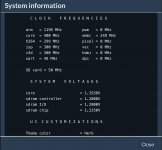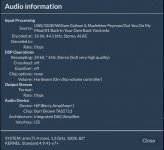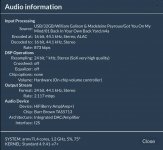Comparing Volumio & Rune, Rune seems to use less resources and runs 8~10C cooler. Do you know how Moode fits in compare the two?
The reason I want to look for an alternative is I am using a DAC hat and my RPi3 CPU temp is 70C+ (which a heatsink on) when playing a DSD file. I am not just worried about the RPI3 but the RPI3 is actually boiling/cooking my DAC hat.
70C is not high at all.
In ambient temps of ~30C, my Pi in an IQ Audio DAC case with no heatsink idles at ~68C
Given it won’t thermally-throttle until ~83C and even then @600MHz the Pi3 has bags more power than is needed for DSD, I don’t see an issue.
My IQ Audio Pi-DAC+ is rated the same as the Pi, to 85C.
Given that pcbs are flow soldered at much greater temps than 85C, it’s not going to “cook” anything, even at sustained temps of ~90C
Static IP
I thought I had it setup with IP pass through enabled. Seems I have much more to learn about networking. Will go back and work on it some more. I am not familiar with dhcp reservation but plan to see how friendly google can be. Cheerio
You need to set your at&t supplied uverse router to operate in pass through mode, as per these posts: ATT Uverse - NETGEAR Communities
Google is your friend...
The other option is to set a dhcp reservation, which gives the best of both worlds
I thought I had it setup with IP pass through enabled. Seems I have much more to learn about networking. Will go back and work on it some more. I am not familiar with dhcp reservation but plan to see how friendly google can be. Cheerio
70C is not high at all.
In ambient temps of ~30C, my Pi in an IQ Audio DAC case with no heatsink idles at ~68C
Given it won’t thermally-throttle until ~83C and even then @600MHz the Pi3 has bags more power than is needed for DSD, I don’t see an issue.
My IQ Audio Pi-DAC+ is rated the same as the Pi, to 85C.
Given that pcbs are flow soldered at much greater temps than 85C, it’s not going to “cook” anything, even at sustained temps of ~90C
Hi Zootalaws,
Your temp is with Moode? I did some experiments yesterday. With room temp of 26C and underclocking I can get down to 54C with rune. Volumio are getting drop outs if I underclock so it can get north of 70C.
Hi Zootalaws,
Your temp is with Moode? I did some experiments yesterday. With room temp of 26C and underclocking I can get down to 54C with rune. Volumio are getting drop outs if I underclock so it can get north of 70C.
I don’t bother with changing clocking - the Pi has that covered in hardware. If it gets to 83C, clocks will be reduced, not something I’ve ever reached, despite ~80%+ humidity and mid 30’s temps.
I don’t fiddle much - I set it up to deliver the services I need, that’s good enough for me. I’m not someone with ears that function well enough to know the difference between 16 and 32 bit encoding. Machine rooms, guns and 70’s motorcycle helmets put paid to that.
If you are resampling, make sure you have multi-threading turned on (configure>audio>mpd settings) so the load is shared...
Last edited:
I thought I had it setup with IP pass through enabled. Seems I have much more to learn about networking. Will go back and work on it some more. I am not familiar with dhcp reservation but plan to see how friendly google can be. Cheerio
DHCP reservation is simple - you find your MAC address of your Pi (from the Orbi menus) and give it a default IP address. The Pi will ask for a dhcp address, router, gateway, and will always get the same, predetermined, IP address.
Especially useful for devices like a Pi which can have many different OSs loaded but you want to always have the same IP.
Hi Zootalaws,
Your temp is with Moode? I did some experiments yesterday. With room temp of 26C and underclocking I can get down to 54C with rune. Volumio are getting drop outs if I underclock so it can get north of 70C.
Further...
After installing sysbench and running all four cores at 100% for ten minutes, in a case, my temp never got over 84C
sudo apt-get install -y sysbench
sysbench --num-threads=4 --max-requests=99999999 --test=cpu run
Nothing moode does will drive the Pi this hard.
Here are before and during stress-test frequencies and temps: as you can see the Pi manages the frequency to keep temps manageable. As a reference, the foundation stress-tests the Pi3 at 120C (in an oven - you can’t get that temp by running it, except in a sealed box)
Attachments
I am curious to see how one goes about transferring music to the Moode Player, which is headless. I have tried using "scp" from a Linux box, but it seems that the flash drive in the Pi where the music is stored is locked or read-only when running in the Moode O/S. I can remove the flash drive and install in my main linux box and copy music with no problem. I am wondering how others transfer files to the Moode Player. I am running the latest 3.8.4 on a Pi3 with 32gig flash drive.
I have all my music on a USB disk attached to my router. That way the music only makes one trip (from router to Moode) rather than two (from computer to router to Moode). I get the music onto the USB disk via a synchronization process from my main computer, which I only run when I've added new music. Streaming seems to work fine in both wired and wireless configurations. As I have three Moode implementations, I prefer to centralize the music files.
Hi there.
Just to let u know:
1. The standard HifiBerryDACPlus driver is not supporting SRs >192k .
2. 384k might work because the base PCM512x codec in the standard kernel supports it nowadays. And the HifiBerry driver is not overriding it.
The HifiBerryDACPlus makes use of that codec.
3. 352k8 is not supported by the base PCM512x codec. Which is a long
standing flaw!
This issue gets patched and is solved by the Moode advanced kernels
E.g. Allo Boss will work perfectly!
4. However. The HifiBerryDACPlus driver would have to be patched by HifiBerry accordingly!
Even if the codec is patched in the advanced kernels, the HifiBerry driver itself won't support 352k8!
5. I doubt that the HifiBerry folks will change that, since the HW has not
shown reliable performance on SRs > 192kHz in the past.
They probably also missed to limit their driver to 192k after the 512x codec was changed to support 384k !
The HifiBerryDACPlus HW capabilities might have changed on recent revisions. You tell us.
IMO. Better buy an e.g. Allo Boss - its HW reliably supports all SRs up to 384k.
I hope this clarifies earlier discussions.
Enjoy.
Just to let u know:
1. The standard HifiBerryDACPlus driver is not supporting SRs >192k .
2. 384k might work because the base PCM512x codec in the standard kernel supports it nowadays. And the HifiBerry driver is not overriding it.
The HifiBerryDACPlus makes use of that codec.
3. 352k8 is not supported by the base PCM512x codec. Which is a long
standing flaw!
This issue gets patched and is solved by the Moode advanced kernels
E.g. Allo Boss will work perfectly!
4. However. The HifiBerryDACPlus driver would have to be patched by HifiBerry accordingly!
Even if the codec is patched in the advanced kernels, the HifiBerry driver itself won't support 352k8!
5. I doubt that the HifiBerry folks will change that, since the HW has not
shown reliable performance on SRs > 192kHz in the past.
They probably also missed to limit their driver to 192k after the 512x codec was changed to support 384k !
The HifiBerryDACPlus HW capabilities might have changed on recent revisions. You tell us.
IMO. Better buy an e.g. Allo Boss - its HW reliably supports all SRs up to 384k.
I hope this clarifies earlier discussions.
Enjoy.
Last edited:
DHCP Reservation soultions
Got it, will go with DHCP reservation. Have two Pize with MoOde, this solution seems ideal. Thank you
DHCP reservation is simple - you find your MAC address of your Pi (from the Orbi menus) and give it a default IP address. The Pi will ask for a dhcp address, router, gateway, and will always get the same, predetermined, IP address.
Especially useful for devices like a Pi which can have many different OSs loaded but you want to always have the same IP.
Got it, will go with DHCP reservation. Have two Pize with MoOde, this solution seems ideal. Thank you
Hi Tim,
Would you consider build for Amlogic cpu? There are many SOC and TV box with Amlogic cpu and have good performance.
Would you consider build for Amlogic cpu? There are many SOC and TV box with Amlogic cpu and have good performance.
Got it, will go with DHCP reservation. Have two Pize with MoOde, this solution seems ideal. Thank you
If you hit a wall, just ask - I can not out the specific method for your Orbi
Hi @mksung,
What application domains would moOde be used in on an Amlogic platform?
-Tim
Prolly the one where a tonne of Chinese and Taiwanese integrators can make a buck off your work, without actually doing anything themselves or remunerating you for your efforts.
That’s usually how it works.
Hi Mike,
Possibly, but Audio is a relatively small community and most companies strive to maintain a great reputation, avoid being sued for doing stupid things, and know that the software running on their device will be continuously improved and supported.
-Tim
Possibly, but Audio is a relatively small community and most companies strive to maintain a great reputation, avoid being sued for doing stupid things, and know that the software running on their device will be continuously improved and supported.
-Tim
Yeah? Look at the thousands of AMS-powered devices running Kodi. How much are they helping improve and support?
If you developed a version that would run on a Cortex M0, for example, what would you get out of it? I could see a vast increase in support, but not much else.
Licensing never works, in such environments. There just isn’t any regulatory framework to enforce IP.
If you developed a version that would run on a Cortex M0, for example, what would you get out of it? I could see a vast increase in support, but not much else.
Licensing never works, in such environments. There just isn’t any regulatory framework to enforce IP.
Hi Mike,
Kodi is 100% Open Source and I would wager that many of the commercial entities redistributing Kodi with their devices are active contributors and donators. This is the classic community model that has been proven to work in many cases.
In my experience, reputable companies will respect each others licensing and copyright. Sure there are going to be abuses but generally there is integrity. Anyway, I'm not an IP cop so I just don't worry about it 🙂
Wrt cross-platform, if there is a business case for porting moOde to other platforms I would consider it but it would have to be compelling because porting would be a huge technical effort and it would introduce a significant support vector. Simply asking to have it ported won't go anywhere.
-Tim
Kodi is 100% Open Source and I would wager that many of the commercial entities redistributing Kodi with their devices are active contributors and donators. This is the classic community model that has been proven to work in many cases.
In my experience, reputable companies will respect each others licensing and copyright. Sure there are going to be abuses but generally there is integrity. Anyway, I'm not an IP cop so I just don't worry about it 🙂
Wrt cross-platform, if there is a business case for porting moOde to other platforms I would consider it but it would have to be compelling because porting would be a huge technical effort and it would introduce a significant support vector. Simply asking to have it ported won't go anywhere.
-Tim
- Home
- Source & Line
- PC Based
- Moode Audio Player for Raspberry Pi




